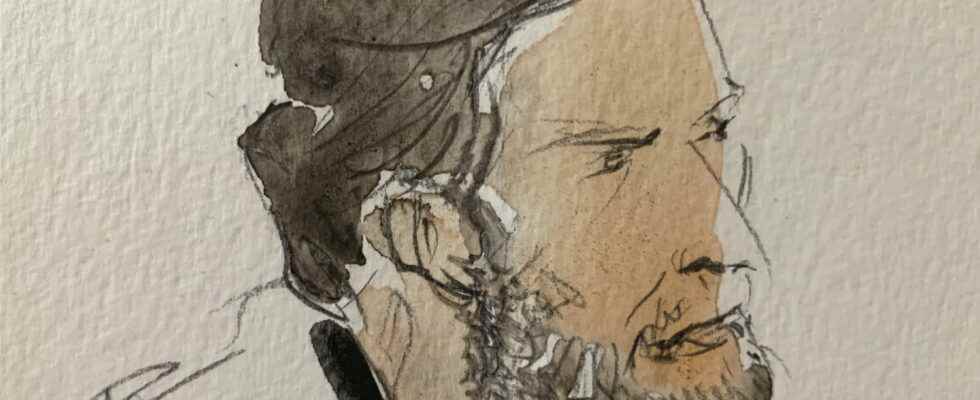ABDESLAM. This Wednesday, June 28, 2022, Salah Abdeslam will know the sentence he will have to serve for having participated in the attacks of November 13 in Paris. It should be historic.
A dramatically historic event, a historic trial and a sentence that also promises to be historic. This Wednesday, June 29, 2022, Salah Abdeslam will know his sentence. The last living member of the armed commando who perpetrated the attacks in Paris on November 13, 2015 should be very heavily sentenced, epilogue of an extraordinary trial, lasting ten months, during which the painful memory of this bloody evening in the capital was revived. It was also an opportunity to shed light on certain gray areas that still hovered over this macabre enterprise committed, in part, by this terrorist of French nationality, now 32 years old.
After the closing of the debates on Monday, during which Salah Abdeslam reiterated his “apologies” to the families of the victims, the judges retired to deliberate in a military barracks in Île-de-France. This Wednesday, they will come out of this secret place where they made their decision to publicly announce the verdict against the man who claims not to be “a murderer, [ni] a killer.” The announcement of the verdict is expected from 5 p.m.
What prison term will Salah Abdeslam be sentenced to?
A historic trial, historic verdict. The Special Assize Court of Paris could pronounce against Salah Abdeslam a sentence which has only been applied on very rare occasions. During its indictment on June 10, the National Anti-Terrorist Prosecutor’s Office (PNAT) had requested the pronunciation of an incompressible life sentence. In other words, a verdict that would condemn Salah Abdeslam to spend the rest of his life in prison, no sentence adjustment can be formulated. An extremely rare conviction, pronounced only four times since its establishment in 1994, targeting until then only criminals who have raped and killed little girls, including Michel Fourniret.
At trial, Salah Abdeslam’s explanations and apologies
The holding of this trial of the attacks of November 13 made it possible to give the floor to Salah Abdeslam. The words of the last living member of the armed commando who struck in the heart of Paris alternated between provocations at the opening of the debates, then excuses and defense over the weeks, he who had locked himself in silence throughout the investigation, even going so far as to quote Voltaire, during calm and polite speeches.
At the beginning of September, Salah Abdeslam had tried to justify the terrorist enterprise, explaining: “we fought France, we targeted the population, civilians, but we have nothing personal about them.” Remarks repeated during a new speech on February 9, putting the blame on François Hollande, who was then President of the Republic at the time: “it was to put an end to the bombardments of the coalition on the soil of The Islamic State.” Because the 32-year-old terrorist intended to defend this ideology, as he himself explained: “In many Arab and Muslim countries, Western values take precedence over Islamic values. And for us Muslims, it’s a humiliation. The Islamic State fights in the way of Allah so that his word is the highest, so that order is restored on earth. And I, this fight, I legitimize it.”
Yet Salah Abdeslam has always tried to minimize his role. “I didn’t kill anyone and I didn’t hurt anyone. Even a scratch, I didn’t do it,” he said in February, before hammering on June 27 before the end of the debates: “the public opinion thinks I was on the terraces, busy shooting people, public opinion says I was at the Bataclan You know the truth is the opposite. […] I went back to prison at the age of 26, I’m not perfect, I made mistakes, it’s true. But I am not an assassin, I am not a killer.” The statements of the terrorist had however made it possible to confirm one element: he was indeed in possession of an explosive belt on November 13, 2015, read who said “present my condolences and apologies to all the victims”. I know that the hatred remains […]I ask you today to hate me in moderation. […] I ask you to forgive me.”
This is one of the many shadows that hovered before the opening of the trial of the attacks of November 13, 2015 perpetrated in Paris: was Salah Abdeslam also to blow himself up in a café in the capital, more precisely in the 18th arrondissement, north of the city? Yes, according to the principal concerned, who had recognized him on April 13. “The objective I was given was to go to a café in the 18th arrondissement”, he declared before the Court, explaining afterwards that he had entered an establishment before giving up: “I will go to this café , I’m going to order a drink, I’m going to look at the people around me and I said to myself, “No, I’m not going to do it.” The only terrorist still alive, however, did not specify the target who had been indicated. But an order to blow himself up in the 18th had indeed been given to him. So much so that the day after the attacks, the press release sent by the Islamic State mentioned the neighborhood as having been attacked, when it had finally been spared.
